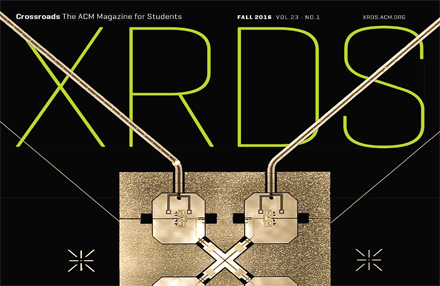Magazine: Fall 2016 | Volume 23, No. 1

Download
- Digital Edition web-based magazine available for subscribers – sign in
- PDF via ACM’s Digital Library
COLUMN: Careers
One thousand interviews
How customer insights keep one company agile, and challenge these data scientist to stay ahead in an ever-changing world.
By Geerten Peek, Ahmet Taspinar
DEPARTMENT: Blogs
CHI 2016
What can 1,000 scientists achieve when they invest one hour doing voluntary work?
By Nur Al-huda Hamdan
An introduction to gamification in human-computer interaction
Improving user experience through game play.
By Gustavo Fortes Tondello
SECTION: Features
Quantum algorithms for machine learning
Quantum computing and machine learning are two technologies that have generated unparalleled amounts of hype among the scientific community and popular press. Both are mysterious, immensely powerful, and on a collision course with each other.
By Bingjie Wang
Many-body quantum mechanics
Special purpose quantum computers---realized with current technology---have the potential to revolutionize physics, chemistry, and materials science.
By Michael L. Wall, Arghavan Safavi-Naini, Martin Gärttner
Black holes, quantum mechanics, and the limits of polynomial-time computability
Which computational problems can be solved in polynomial-time and which cannot? Though seemingly technical, this question has wide-ranging implications and brings us to the heart of both theoretical computer science and modern physics.
By Stephen P. Jordan
Reliable quantum circuits have defects
The first large-scale practical quantum computer is within reach. Coming to grips with the strategy and challenges of preparing reliable executions of an arbitrary quantum computation is not difficult. In fact, defects are good.
By Alexandru Paler, Austin G. Fowler, Robert Wille
Establishing quantum advantage
What are quantum computers good for? This essay reviews the progress toward proving a quantum advantage over classical computing.
By Adam Bouland
Programming quantum computers using 3-D puzzles, coffee cups, and doughnuts
Programming a quantum computer is a task as baffling as quantum mechanics itself. But it now looks like a simple 3-D puzzle may hold the solution.
By Simon J. Devitt
Black holes and the limits of quantum information processing
The densest memories and the fastest processors imaginable on computers located billions of light-years away
By Brian Swingle
Undecidability of the spectral gap
What happens to undecidability in the quantum computing paradigm?
By Johannes Bausch
SECTION: Profile
David Deutsch
Understanding computation as a consequence of physics
By Adrian Scoică





















